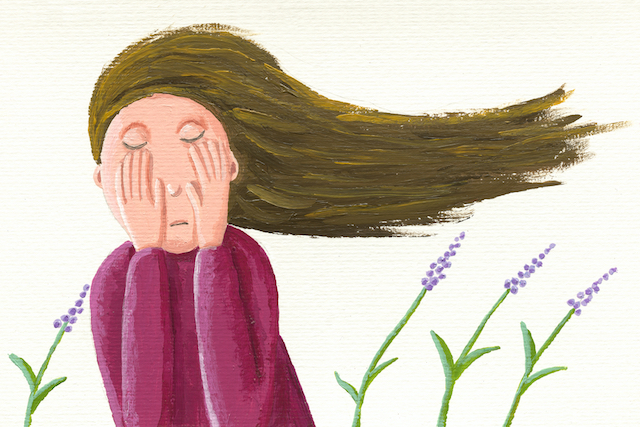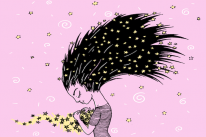
“The major block to compassion is the judgment in our minds. Judgment is the mind’s primary tool of separation.” ~David R. Hamilton
On the evening of October 28, 2014, the phone rang. When I heard my stepmother’s voice, immediately, I thought, “This can’t be good.”
Last I had heard, my father was resting comfortably after routine surgery earlier that day. Now it was past midnight in North Carolina.
“Jill,” my stepmother implored, “please talk to the nurses. I have no idea what they are trying to tell me.” Sometimes we cannot listen to what we do not want to hear.
The nurse came on the phone and confirmed my worst fears. My father had suddenly become septic and was quickly heading into multiple organ failure.
In her “I’m trying to tell a complete stranger her father is dying in the nicest way possible” kind of voice, the nurse told me I might want to make plans to get out there as soon as possible; now would be good.
I booked the first available flight. Sleepless and terrified, I boarded the plane. After settling into my seat, a lifetime of Dad memories raced through my mind. A lump in my throat began to rise and swell at the thought of seeing my father, helpless and frail, making his way from this world to the next.
“Please don’t lose it on this plane,” I carefully cajoled myself.
A distraction seemed in order, so I put the earbuds in, set the music to shuffle, and held my breath. As luck would have it, the first song depicted a powerful tale of loss that felt like an illuminated road sign on a dark, lonely highway. Death is a road we all travel.
When I heard the words of my own story, told by someone I had never met, I couldn’t hold back anymore. First a few quiet tears, followed by the full-on ugly cry—right there in row 17, seat C.
“Oh dear,” I thought, “I am officially that person.”
We all know that person: the one who breaks into tears in the grocery line after discovering “happily ever after” was not to be. The co-worker stifling sobs behind the fourth-floor bathroom stall when he learns he is next to be downsized. Or, in my case, the middle-aged woman in 17C trying desperately to get home in time to say goodbye to her father.
Amidst heaving sobs, I glanced across the aisle and met the gaze of a fellow passenger. With only his eyes, he kindly whispered, “Yep. You’re that person.” With only my eyes, in return, I answered, “Yep. You’re right.”
It was as if life had stolen my undergarments and hung them in the public square to dry. I felt exposed, raw, ashamed. If only my feelings would have shown up on schedule, preferably in the privacy of my own home, thank you very much.
Humans can be parsed into two categories: those who have been that person and those who will be. Like a rude party guest, the unsoothable pain of loss can show up, uninvited, at the worst possible times and demand from us things we don’t want to give.
So often we shun grief or sorrow that cannot wait for a convenient time to be felt. Perhaps witnessing another’s sorrow ignites our own, so we create a safe distance with our judgment: “Some people really oughta learn how to keep it together.”
We wouldn’t tell a child in pain to knock it off and keep it together. Why would we say this to ourselves? Why would we demand this from others?
I regret to inform you feelings cannot be scheduled. There will be moments when the thread unspools faster than we can wind it. This is okay.
Feelings do not need to be fixed because they are not broken; neither are you.
It is when we are most vulnerable that we are most deserving of our own loving-kindness. Those song lyrics and the compassion in my aisle mate’s eyes were the only things I needed that day. While it didn’t make the pain stop, I did feel a little less alone with it, which made all the difference.
We know that person because we are that person.
When it is your turn in the cosmic hot seat, I invite you to offer yourself the blessing of your own loving grace. Speak to yourself as you would a child in pain. If you get the honor of bearing witness to another’s unspooling, why not offer your fellow human the same blessing: I see you. I hear you. I love you.
Sad girl image via Shutterstock
About Jill Gross
Dr. Jill Gross is a licensed psychologist, grief and divorce specialist, and mother of two. She lives and practices in Seattle, Washington. To find out more about Dr. Jill, please visit www.drjillgross.com.
- Web |
- More Posts












 Though I run this site, it is not mine. It's ours. It's not about me. It's about us. Your stories and your wisdom are just as meaningful as mine.
Though I run this site, it is not mine. It's ours. It's not about me. It's about us. Your stories and your wisdom are just as meaningful as mine.
Settling down to a light-hearted read over breakfast, I suddenly realise you are writing about the impending death of my own father (due any moment) and burst into tears over the keyboard. Thanks so much for the advance warning and the little practise in the privacy of my own home. Yes I will probably become that person on the plane, but no, I can’t do anything about it except know it’s going to happen. Thanks Jill
Sorry to hear about your dad, Alex. Never a good time to say goodbye. Glad you got a good cry in–feeling is healing!
Sending hugs and love from Seattle,
Jill
Thanks Jill, and hugs to you also. I love that you have made some good of your pain and loss by helping others
Thanks for that powerful reminder… I too have been that person, and usually do the other thing I can’t stand and apologize for my tears. Thank you and sorry for your loss.
Thank you, Tina. Here’s to tears without apologies! 🙂
Thank you so much for this article in was so inspiring to me! I have been dealing with a lot lately and i just cried it all out today right in front of my mom and my sister. So I understand how it is! It feels good to cry it out and to really feel it, it’s healing.
Good for you, Paula! We are a legion of “those people.” 🙂
This was an amazing read, so well-written and full of relatable points. After my breakup in 2013, I was that person and even cried at a big grocery store checkout line because the girl was kind to me and it triggered everything again. We are taught to bottle up our emotions and live like our selfies. I call that BS. Love this post! Thank you for sharing!!
You’re welcome, Banu. It’s true: simple acts of kindness can be just enough to turn on the feelings! Sounds like you wore the “that person” badge with honor and courage!